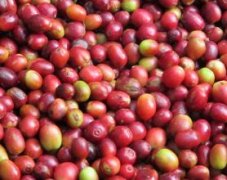A brief introduction to the Origin, Development, History and Culture of Columbia's exquisite Fine Coffee

Colombian coffee is famous for its boutique quality, soft taste and high taste. It all depends on the fact that the right climate in Colombia provides a real "natural pasture" for coffee. And the coffee varieties planted are mainly high-quality Arabica varieties. Coffee trees in Colombia are mainly cultivated in the Andes, on steep slopes about 1300 meters above sea level, where the annual temperature is about 18 degrees Celsius, annual rainfall is 2000 to 3000 millimeters, latitude 1 °- 11 °north, longitude 72 °- 78 °west, and 2000 meters above sea level. These conditions are very suitable for the growth of coffee, coupled with a mild climate, humid air, and can be harvested regardless of season. Therefore, this is why Colombian coffee is of high quality and enjoys a high reputation in the world.
Colombia, on the other hand, has three Codiera mountains running north-south, right into the Andes. Coffee is grown along the highlands of these mountains. The mountain steps provide a diverse climate, where the whole year is the harvest season, and different kinds of coffee ripen at different times. And fortunately, unlike Brazil, Colombia doesn't have to worry about frost. Colombia has about 2.7 billion coffee trees, 66 per cent of which are planted in modern plantations and the rest on small traditionally run farms.
One of the most famous producing areas is Nalinglong province. The other real name is Narino, literally translated as "Narinho", and translated as "Na Linglong" by the domestic coffee industry. Na Linglong has a balanced and soft flavor, clean and rich flavors of apricot, grapefruit and toffee, so it is popular with coffee gluttons. And this is because: Colombia is famous for its high altitude, the lower elevation in the north-central part mainly produces commercial beans, and the south-central part mainly produces high-quality beans. The south-central region is also the area for the winners of previous "extraordinary cups" and SCAA "Coffee of the year", and Nalinglong Province is one of them. At the same time, the quality of Colombian coffee beans is divided into more than 200 grades, with SUPERMO as the highest grade, followed by EXCELSO, but only selected coffee with beans No. 18 (diameter 18x64 inches in diameter) can be included in the selection. And Na Linglong is the SUPERMO quality. And this is also closely related to Na Linglong's choice of high-quality Kaddura varieties and high-quality natural conditions.
And the annual rainfall in Nalinglong province shows a peak distribution, with a rainy season, which lasts from October of that year to May of the following year, and the dry season lasts for June, July and August. However, even in dry months, coffee farmers will not worry too much, because the warm current caused by trade winds from the southern continent meets with cool nights to produce enough water vapor to replenish coffee trees. Thanks to this, Na Linglong's secret of quality has come to light.
As a result, it is no wonder that Na Linglong won the top six places in the 2010 Columbia COE Competition, with eight places in Top10 and 17 places in Top21. The high quality can be seen from this.
And that's why I only recommend Na Linglong this bean to you. If you choose moderate baking, its rich flavor of apples, apricots, grapefruit, cream and toffee will never let you down.
Tujing, the exquisite producing area of Columbia.
Colombia, on the other hand, has three Codiera mountains running north-south, right into the Andes. Coffee is grown along the highlands of these mountains. The mountain steps provide a diverse climate, where the whole year is the harvest season, and different kinds of coffee ripen at different times. And fortunately, unlike Brazil, Colombia doesn't have to worry about frost. Colombia has about 2.7 billion coffee trees, 66 per cent of which are planted in modern plantations and the rest on small traditionally run farms.
One of the most famous producing areas is Nalinglong province. The other real name is Narino, literally translated as "Narinho", and translated as "Na Linglong" by the domestic coffee industry. Na Linglong has a balanced and soft flavor, clean and rich flavors of apricot, grapefruit and toffee, so it is popular with coffee gluttons. And this is because: Colombia is famous for its high altitude, the lower elevation in the north-central part mainly produces commercial beans, and the south-central part mainly produces high-quality beans. The south-central region is also the area for the winners of previous "extraordinary cups" and SCAA "Coffee of the year", and Nalinglong Province is one of them. At the same time, the quality of Colombian coffee beans is divided into more than 200 grades, with SUPERMO as the highest grade, followed by EXCELSO, but only selected coffee with beans No. 18 (diameter 18x64 inches in diameter) can be included in the selection. And Na Linglong is the SUPERMO quality. And this is also closely related to Nalinglong's selection of high-quality Kaddura varieties and high-quality natural conditions, which are inseparable from the picture of coffee growing areas in Nalinglong province.
Nalinglong province is closer to the equator, about one degree north latitude, with plenty of light throughout the year; the elevation is more than 1600 meters, and there are few snow peaks all the year round in the territory. Steep mountains and narrow steep slopes bring a warm and diverse climate. The warm and humid air rising from the canyon protects coffee grown at high altitude from frost, so that coffee can be grown smoothly at an altitude of 2300 meters. Volcanic soil provides rich nutrients for the growth of coffee.
Important Notice :
前街咖啡 FrontStreet Coffee has moved to new addredd:
FrontStreet Coffee Address: 315,Donghua East Road,GuangZhou
Tel:020 38364473
- Prev

A brief introduction to the description of flavor, taste and aroma characteristics of Columbia exquisite coffee beans
And the annual rainfall in Nalinglong province shows a peak distribution, with a rainy season, which lasts from October of that year to May of the following year, and the dry season lasts for June, July and August. However, even in dry months, coffee farmers will not worry too much, because the warm current caused by trade winds from the southern continent will produce enough water vapor when they meet with a cool night, just to replenish the coffee trees with water.
- Next

A brief introduction to the Market Price of Columbia Linglong Coffee Bean varieties with High balance
There are two series of coffee in the world, one is the hard coffee represented by Brazil, which has a strong flavor, and the other is the soft coffee represented by Colombia, which has a light flavor. The difference lies in the altitude of the producing area and the method of planting. Coffee is planted extensively in hilly red soil in Brazil and intensive cultivation in mountain black soil in Colombia. The Colombian super aroma is rich and thick, with a bright
Related
- Detailed explanation of Jadeite planting Land in Panamanian Jadeite Manor introduction to the grading system of Jadeite competitive bidding, Red bid, Green bid and Rose Summer
- Story of Coffee planting in Brenka region of Costa Rica Stonehenge Manor anaerobic heavy honey treatment of flavor mouth
- What's on the barrel of Blue Mountain Coffee beans?
- Can American coffee also pull flowers? How to use hot American style to pull out a good-looking pattern?
- Can you make a cold extract with coffee beans? What is the right proportion for cold-extracted coffee formula?
- Indonesian PWN Gold Mandrine Coffee Origin Features Flavor How to Chong? Mandolin coffee is American.
- A brief introduction to the flavor characteristics of Brazilian yellow bourbon coffee beans
- What is the effect of different water quality on the flavor of cold-extracted coffee? What kind of water is best for brewing coffee?
- Why do you think of Rose Summer whenever you mention Panamanian coffee?
- Introduction to the characteristics of authentic blue mountain coffee bean producing areas? What is the CIB Coffee Authority in Jamaica?

